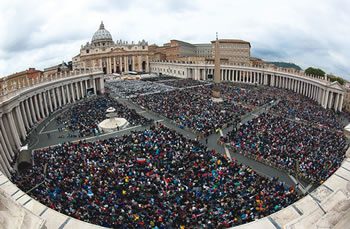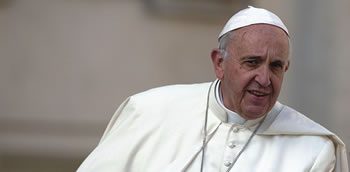Christ is Risen
Being aware of our shortcomings
“Why do you see the speck that is in your brother’s eye, but do not notice the log that is in your own eye?” (Matthew 7:3). So many times, we all know it, it’s easier and more comfortable to see and condemn the defects and sins of others, without being able to see our own with as much lucidity. We always hide our defects, we hide them even from ourselves; instead, it’s easy to see others’ defects. The temptation is to be indulgent with oneself — to be easy-going with oneself and hard with others. It’s always useful to help one’s neighbour with wise counsels; however, while we observe and correct the defects of our neighbour, we must be aware that we ourselves also have defects. If I think I don’t have any, I can’t condemn and correct others. We all have defects — all of us. We must be aware of our defects, and, before condemning others, we must look within ourselves. Thus we can act in a credible way, with humility, witnessing charity.
The good-hearted produce
good fruit
How can we know if our eye is free or if a beam impedes it? It’s again Jesus who tells us: “For no good tree bears bad fruit, nor again does a bad tree bear good fruit; for each tree is known by its fruit” (Luke 6:43-44). The fruit is actions, but also words. Also from words, one knows the quality of the tree. In fact, one who is good brings out good from his heart and his mouth, and one who is evil brings out evil, carrying out the most harmful practice, which is murmuring, gossip, speaking badly of others.
This destroys the family, it destroys the school, it destroys the workplace, it destroys the neighbourhood. Wars begin from the tongue. Let us think a bit about this teaching of Jesus and ask ourselves the question: do I speak badly of others? Do I always try to soil others? Is it easier for me to see the defects of others rather than my own? And let us try to correct ourselves at least a bit: it will do us all good.
We invoke the support and intercession of Mary to follow the Lord on this path.
Angelus address, 3 March 2019
Source: Zenit
A sense of direction
When your heart is turned away, when you take the road that is not right – either going the wrong way or taking a different road, but not going along the right road – you lose your sense of direction, you lose your compass, with which you should go forward. And a heart without a compass is a public danger: it’s a danger for the person himself, and for others. And a heart takes this wrong path when it does not listen, when it allows itself to go astray, carried away by [other] gods, when it becomes an idolater.
The grace of memory
Well-being, even spiritual well-being, has this danger: the danger of a certain amnesia, a lack of memory. I feel good like that, and I forget what the Lord has done in my life, all the graces he has given us, and I believe that it is my own merit, and I go on like that. And then the heart begins to turn away, because it doesn’t listen to the voice of the heart itself: memory. The grace of memory.
Remember Christ risen
 Idolatry is an attitude of the heart, when you prefer to do something because it is more comfortable for me, instead of the Lord – precisely because we have forgotten the Lord. It is good for all of us to ask for the grace to preserve memory, to preserve the memory of everything the Lord has done in my life: how he loved me so much, how he loved me. And from that memory, to go forward. And it would also do us good to repeat continually the advice of Paul to Timothy, his beloved disciple: “Remember Jesus Christ, risen from the dead”. I repeat: “Remember Jesus Christ, risen from the dead”. Remember Jesus, Jesus who has accompanied me up to now, and will accompany me until the moment when I must appear before Him in glory. May the Lord give us the grace to preserve memory”.
Idolatry is an attitude of the heart, when you prefer to do something because it is more comfortable for me, instead of the Lord – precisely because we have forgotten the Lord. It is good for all of us to ask for the grace to preserve memory, to preserve the memory of everything the Lord has done in my life: how he loved me so much, how he loved me. And from that memory, to go forward. And it would also do us good to repeat continually the advice of Paul to Timothy, his beloved disciple: “Remember Jesus Christ, risen from the dead”. I repeat: “Remember Jesus Christ, risen from the dead”. Remember Jesus, Jesus who has accompanied me up to now, and will accompany me until the moment when I must appear before Him in glory. May the Lord give us the grace to preserve memory”.
Homily, Santa Marta, 7 March 2019
Source: Vatican News

 Entries(RSS)
Entries(RSS)